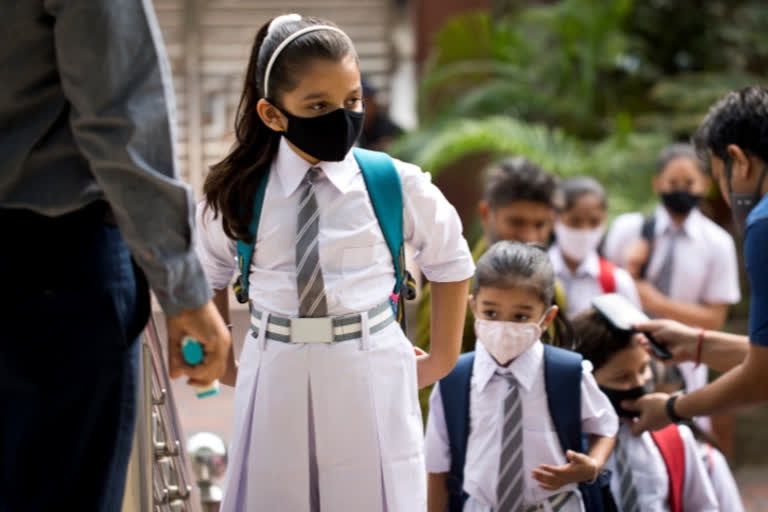Nearly 100 school children in the NCR region of the capital have been infected with SARS-CoV-2, the virus causing COVID-19 disease, in the last few days. Since the beginning of the new academic session in April, about 59 students in Gautam Budh Nagar and 32 in Ghaziabad across 22 schools tested positive for COVID. Several schools in Delhi have also reported positive cases. Besides children, teachers have also been infected.
Health authorities in Delhi and Noida have instructed schools to follow the COVID protocols strictly and to set up COVID help desks. Schools have been directed to close down the wing or the school completely even if a single case of COVID is reported among students. Parents have also been asked not to send children to school if they report any symptoms of viral illness.
"COVID-19 cases are showing a rapid surge in the paediatric group at the moment, especially in our NCR region because the kids have started attending school. They are not vaccinated yet as the vaccine is still under trial for under 12 years of age group," Dr. Col. Vijay Dutta, Senior Consultant, Indian Spinal Injuries Centre, told IANS. "With gaps in the precautionary measures the infection will happen," added Dr Smita Malhotra, Consultant, and Paediatric Gastroenterologist, Indraprastha Apollo Hospitals, New Delhi.
The doctors pointed out that the typical symptoms include mild cough, cold, fever and headache. In a few cases, the symptoms can be diarrhoea and fatigue. So far, there are no pneumonia cases in the paediatric group, they noted. Meanwhile, with 2,183 infections, India has seen a 90 per cent jump COVID cases in the last 24 hours.
While the cases are rising significantly, "it is too early to call it the fourth wave", Dr. Meena J, Consultant, Paediatrics & Neonatology, Aakash Healthcare, Dwarka told IANS. According to experts, the BA.2 sub-variant of Omicron is currently the predominant strain in the country.
While COVID cases among children were significantly low worldwide during the last two years of the pandemic, the Omicron wave, which began in late November last year, caused increased infections in kids. Children were majorly affected with multisystem inflammatory syndrome and upper airway infection, such as laryngotracheobronchitis (commonly known as croup) which is characterised by barking cough, and noisy breathing.
A recent study published in the JAMA Paediatrics showed that upper airways infection increased during the Omicron surge. It led to a surge in hospitalisation with several kids requiring invasive ventilation, vasopressors, or extracorporeal membrane oxygenation, and even deaths, in the US. The study by a team of researchers from US universities of Colorado and Northwestern found that small and relatively collapsible airways in young children make them more vulnerable to upper airway infection such as croup, which, if severe, can lead to cardiac arrest.
Because children below 12 years of age cannot be vaccinated, it raises their risk of contracting COVID. Thus "following the universal precautionary measures, which includes hand washing, social distancing and wearing masks" is essential, Malhotra said. "The Government of India should also speed up their vaccination programme for kids. In school, kids should be taught some behaviours of covering their face while sneezing and coughing. Whenever they sneeze or cough, they should cover their mouth and nose with a tissue and throw away that issue immediately," Dutta said. "They should wash their hands with soap and water or with the alcohol-based sanitisers at regular intervals in order to prevent the spread of infection in the paediatric group," he added.
(IANS)
Also Read: Long COVID: Breathlessness, eye problem, muscle weakness, dementia most common symptoms



